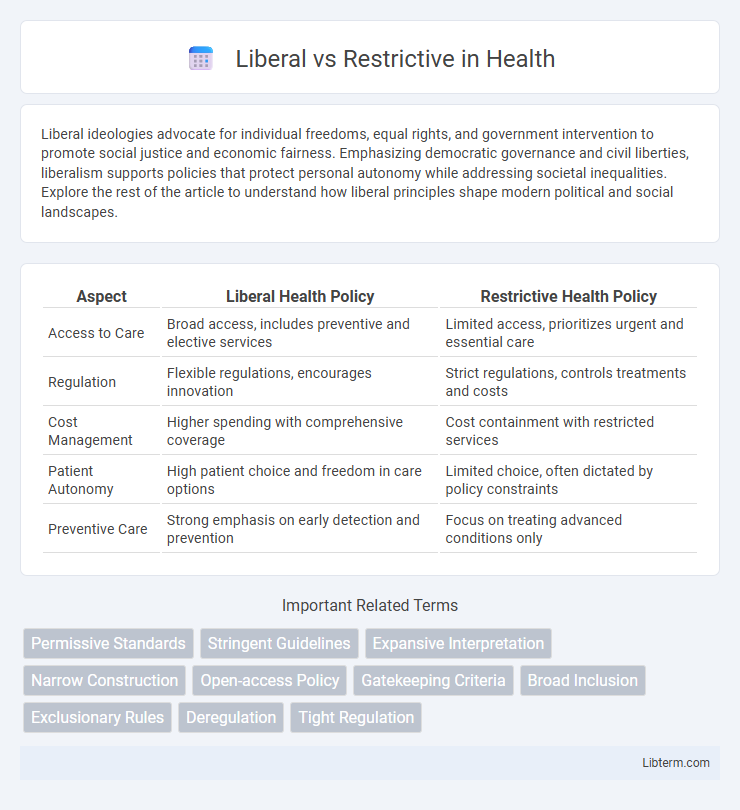Liberal ideologies advocate for individual freedoms, equal rights, and government intervention to promote social justice and economic fairness. Emphasizing democratic governance and civil liberties, liberalism supports policies that protect personal autonomy while addressing societal inequalities. Explore the rest of the article to understand how liberal principles shape modern political and social landscapes.
Table of Comparison
| Aspect | Liberal Health Policy | Restrictive Health Policy |
|---|---|---|
| Access to Care | Broad access, includes preventive and elective services | Limited access, prioritizes urgent and essential care |
| Regulation | Flexible regulations, encourages innovation | Strict regulations, controls treatments and costs |
| Cost Management | Higher spending with comprehensive coverage | Cost containment with restricted services |
| Patient Autonomy | High patient choice and freedom in care options | Limited choice, often dictated by policy constraints |
| Preventive Care | Strong emphasis on early detection and prevention | Focus on treating advanced conditions only |
Defining Liberal and Restrictive Approaches
Liberal approaches prioritize individual freedoms, open access, and minimal governmental intervention, promoting autonomy and broad rights in social, economic, or legal contexts. Restrictive approaches emphasize control, regulation, and limitations imposed by authorities to maintain order, security, or morality, often limiting personal freedoms to achieve collective goals. The distinction lies in the balance between personal liberty and societal constraints, shaping policies in areas like immigration, speech, and drug regulation.
Historical Background and Evolution
Liberal and restrictive approaches to policies and governance have evolved significantly over centuries, shaped by key historical events such as the Enlightenment and the Industrial Revolution. The liberal tradition, rooted in ideas of individual freedom and limited government, gained prominence in the 18th and 19th centuries, advocating for civil rights and economic liberties. Conversely, restrictive policies often emerged in response to social upheaval or security concerns, emphasizing state control and regulation to maintain order.
Key Principles of Liberal Policies
Liberal policies prioritize individual freedoms, equality, and social justice by advocating for minimal government intervention in personal choices and economic activities. They emphasize protecting civil liberties, promoting equal rights, and ensuring access to education and healthcare as fundamental components of a fair society. Core principles include support for democratic governance, market regulation to prevent monopolies, and policies aimed at reducing social inequalities.
Core Tenets of Restrictive Policies
Restrictive policies prioritize stringent regulations to limit access or control, emphasizing security, compliance, and risk mitigation as core tenets. They often enforce strict eligibility criteria, rigorous monitoring, and penalties for non-compliance to maintain order and protect resources. This approach aims to minimize vulnerabilities by tightly managing who can participate and under what conditions.
Liberal vs Restrictive: Case Studies
Liberal and restrictive regulatory approaches significantly impact economic growth and social outcomes, as demonstrated in comparative case studies. For example, the liberal labor market policies in Denmark emphasize flexibility and worker protection, resulting in low unemployment and high productivity, while restrictive policies in France have led to higher job security but increased unemployment rates. Case studies from environmental regulations show that liberal frameworks in New Zealand encourage innovation and sustainable practices, whereas restrictive policies in India often create compliance challenges and limit business expansion.
Impact on Individual Rights and Freedoms
Liberal policies generally expand individual rights and freedoms by promoting autonomy, free expression, and equal protection under the law, fostering a more inclusive society. Restrictive policies often limit personal liberties through increased regulations, surveillance, or censorship, impacting privacy and freedom of speech. The balance between these approaches significantly shapes civil rights, with liberal frameworks encouraging empowerment while restrictive measures prioritize security and order.
Societal and Economic Outcomes
Liberal policies often promote greater individual freedoms and open markets, leading to diverse economic opportunities and innovation, which can enhance overall societal wealth and social mobility. Restrictive approaches may prioritize security and stability, potentially reducing economic volatility but sometimes limiting entrepreneurship and social inclusiveness. The balance between liberal and restrictive policies significantly impacts income distribution, employment rates, and social cohesion in varying economic contexts.
Global Perspectives and Variations
Liberal immigration policies prioritize open borders, facilitating easier movement of people for work, education, and asylum, while restrictive policies emphasize national security, economic protection, and cultural cohesion through stringent border controls and visa limitations. Countries like Canada and Germany adopt liberal approaches to attract skilled migrants and address labor shortages, whereas nations such as Japan and Saudi Arabia maintain restrictive policies to preserve cultural identity and control population growth. Global variations in immigration frameworks reflect diverse political ideologies, economic needs, and historical contexts shaping how states balance openness with sovereignty concerns.
Current Trends and Debates
Liberal immigration policies prioritize open borders and inclusivity, reflecting trends toward global mobility and multicultural integration, while restrictive policies emphasize national security and economic protectionism amid growing concerns over illegal immigration and labor market impacts. Current debates revolve around balancing humanitarian obligations with border control, addressing refugee influxes, and the economic effects of immigration on wages and public services. Data from recent policy shifts show fluctuating visa approvals and enforcement intensity, highlighting ongoing tensions between liberal advocacy groups and conservative policymakers.
Future Implications and Recommendations
Liberal policies foster innovation and adaptability, encouraging economic growth and social inclusivity, which positions societies to better manage future uncertainties. Restrictive approaches may limit opportunities for technological advancement and social mobility, potentially hindering progress and exacerbating inequalities. Strategic recommendations advocate for balanced frameworks that leverage liberal flexibility while implementing safeguards to ensure equitable and sustainable development.
Liberal Infographic

 libterm.com
libterm.com